United States Declaration of Independence

The Declaration of Independence is a statement adopted by the Continental Congress on July 4, 1776, announcing that the thirteen American colonies then at war with Great Britain were no longer a part of the British Empire. Drafted by Thomas Jefferson, and revised and approved by the Second Continental Congress on July 4, 1776, the Declaration is a formal explanation of why Congress had voted on July 2 to obtain independence.
Quotes from the Declaration
[edit]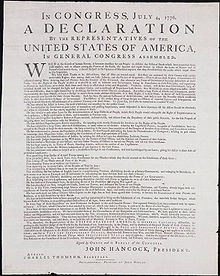
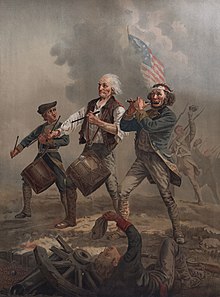

- When in the Course of human events, it becomes necessary for one people to dissolve the political bands which have connected them with another, and to assume among the powers of the earth, the separate and equal station to which the Laws of Nature and of Nature's God entitle them, a decent respect to the opinions of mankind requires that they should declare the causes which impel them to the separation.
- The reference to "the Laws of Nature and of Nature's God" appears to be borrowed from Alexander Pope, An Essay on Man, epistle iv, line 331: "Slave to no sect, who takes no private road, But looks through Nature up to Nature’s God"; Pope, in turn, may have borrowed it from a letter to Pope by Henry, Viscount Bolingbroke St. John, who praised the modesty of "[o]ne follows Nature and Nature's God; that is, he follows God in his works and in his word".
- We hold these truths to be self-evident, that all men are created equal, that they are endowed by their Creator with certain unalienable Rights, that among these are Life, Liberty and the pursuit of Happiness.—That to secure these rights, Governments are instituted among Men, deriving their just powers from the consent of the governed, That whenever any Form of Government becomes destructive of these ends, it is the Right of the People to alter or to abolish it, and to institute new Government, laying its foundation on such principles and organizing its powers in such form, as to them shall seem most likely to effect their Safety and Happiness.
- Comparable to: "All men are born free and equal, and have certain natural, essential, and unalienable rights", Constitution of Massachusetts (1779)
- We must, therefore,…hold them, as we hold the rest of mankind, Enemies in War, in Peace Friends.
- On the British
- We, therefore, the Representatives of the united States of America, in General Congress, Assembled, appealing to the Supreme Judge of the world for the rectitude of our intentions, do, in the Name, and by Authority of the good People of these Colonies, solemnly publish and declare, That these united Colonies are, and of Right ought to be Free and Independent States, that they are Absolved from all Allegiance to the British Crown, and that all political connection between them and the State of Great Britain, is and ought to be totally dissolved.
- And for the support of this Declaration, with a firm reliance on the protection of divine Providence, we mutually pledge to each other our Lives, our Fortunes and our sacred Honor.
Earlier drafts
[edit]- We hold these truths to be sacred & undeniable; that all men are created equal & independent , that from that equal creation they derive rights inherent & inalienable, among which are the preservation of life, & liberty, & the pursuit of happiness; that to secure these ends, governments are instituted among men, deriving their just powers from the consent of the governed; that whenever any form of government shall become destructive of these ends, it is the right of the people to alter or to abolish it
- Thomas Jefferson, "'Original Rough Draught' of the Declaration of Independence" (June 1776), p. 1; in The Papers of Thomas Jefferson (1950) edited by Julian P. Boyd, Vol. 1, p. 423[1]
- he has waged cruel war against human nature itself, violating it's most sacred rights of life & liberty in the persons of a distant people who never offended him, captivating & carrying them into slavery in another hemisphere, or to incur miserable death in their transportation thither. this piratical warfare, the opprobrium of infidel powers; is the warfare of the Christian king of Great Britain. determined to keep open a market where MEN should be bought & sold he has prostituted his negative for suppressing every legislative attempt to prohibit or to restrain this execrable commerce: and that this assemblage of horrors might want no fact of distinguished die, he is now exciting those very people to rise in arms among us, and to purchase that liberty of which he has deprived them, by murdering the people upon whom he also obtruded them: thus paying off former crimes committed against the liberties of one people, with crimes which he urges them to commit against the lives of another.
- Thomas Jefferson, "'Original Rough Draught' of the Declaration of Independence" (June 1776), p. 3; in The Papers of Thomas Jefferson (1950) edited by Julian P. Boyd, Vol. 1, p. 423[2]
- Known as the "anti-slavery clause", this section drafted by Thomas Jefferson was removed from the Declaration at the behest of representatives of South Carolina.
- in every stage of these oppressions we have petitioned for redress in the most humble terms; our repeated petitions have been answered by repeated injury.
- Thomas Jefferson, "'Original Rough Draught' of the Declaration of Independence" (June 1776), p. 3; in The Papers of Thomas Jefferson (1950) edited by Julian P. Boyd, Vol. 1, p. 423[3]
Quotes about the Declaration
[edit]- Alphabetized by author
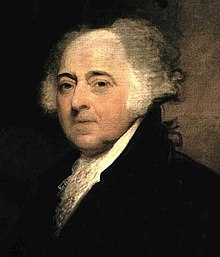




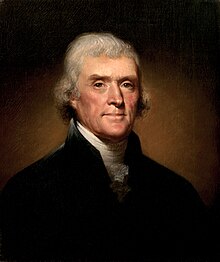
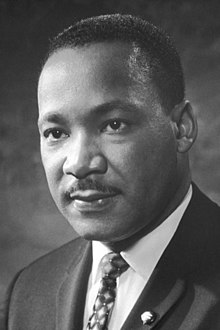
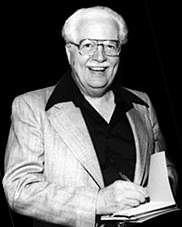
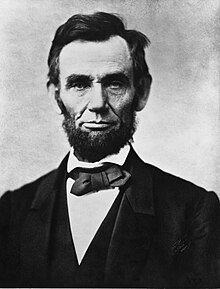
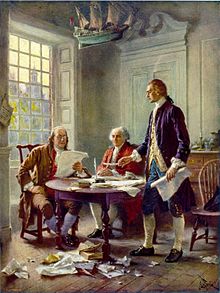
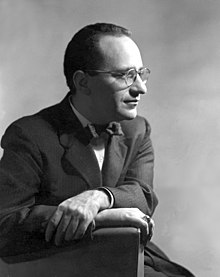
- Is it not that the Declaration of Independence first organized the social compact on the foundation of the Redeemer’s mission upon earth? That it laid the corner stone of human government upon the first precepts of Christianity, and gave to the world the first irrevocable pledge of the fulfillment of the prophecies, announced directly from Heaven at the birth of the Savior and predicted by the greatest of the Hebrew prophets six hundred years before?
- John Quincy Adams, An Oration Delivered Before the Inhabitants of the Town of Newburyport, at Their Request, on the Sixty-first Anniversary of the Declaration of Independence, July 4th, 1837 (Newburyport: Charles Whipple, 1837), pp. 5-6.
- Flights of oratory... especially that concerning Negro slavery, which, though I knew his Southern brethren would never suffer to pass in Congress, I certainly would never oppose.
- John Adams, regarding a draft of the U.S. Declaration of Independence (1776), as quoted in The Founding Fathers: John Adams: A Biography in his own Words (1973), by James Bishop Peabody, Newsweek, New York, p. 201.
- I am well aware of the Toil and Blood and Treasure, that it will cost Us to maintain this Declaration, and support and defend these States. Yet through all the Gloom I can see the Rays of ravishing Light and Glory. I can see that the End is more than worth all the Means. And that Posterity will triumph in that Days Transaction, even although We should rue it, which I trust in God We shall not.
- John Adams, letter to Abigail Adams (1776-07-03), published in The Adams Papers : Adams Family Correspondence (2007) edited by Margaret A. Hogan
- Here, in the first paragraph of the Declaration, is the assertion of the natural right of all to the ballot; for how can "the consent of the governed" be given, if the right to vote be denied?
- Susan B. Anthony, in her "Is It a Crime for a Citizen of the United States to Vote?" speech before her trial for voting (1873)
- The Declaration of Independence asserted the natural right of revolution as a principle of American nationality. This was a moral and political right, to be exercised prudentially, that justified resistance to oppressive government. It was not a claim of legal immunity imposing duty and obligation on others not to interfere.
- Herman Belz, "Review Essay" (2004), Journal of the Abraham Lincoln Association, University of Illinois Press
- In this preamble however it is, that they attempt to establish a theory of Government; a theory, as absurd and visionary, as the system of conduct in defence of which it is established, is nefarious.
- Jeremy Bentham, Short Review of the Declaration,[4] in An Answer to the Declaration of the American Congress, by John Lind (1776), p. 120, as quoted in The Declaration of Independence: America's First Founding Document in U.S. History and Culture (2018), p. 20
- 245 years ago we declared our independence from a distant king. Today we’re closer than ever to declaring our independence from a deadly virus. That’s not to say the battle against COVID-19 is over, we’ve got a lot more work to do. But just as our declaration in 1776 was a call to action, not a reason for complacency, or a claim of victory, it was a call to action. The same is true today. Back then we had the power of an idea on our side, today we have the power of science. Thanks to our heroic vaccine effort, we’ve gained the upper hand against this virus. We can live our lives, our kids can go back to school, our economy is roaring back. Don’t get me wrong. COVID-19 has not been vanquished. We all know powerful variants have emerged like the Delta variant. But the best defense against these variants is to get vaccinated. My fellow Americans it is the most patriotic thing you can do. So please, if you have not gotten vaccinated, do it, do it now. For yourself. For your loved ones. For your community. For your country. You know, that is how we’re going to stay ahead of these variants and protect the hardwon progress we’ve made.
- Joe Biden, "Declaring Our Independence from a Deadly Virus" 2021. Vital Speeches of the Day 87 (9): 213–14.
- The Declaration of Independence should have read thus:
- "We hold these truths to be self-evident: that all men are created equal; that they are endowed by their Creator with certain inalienable rights; that among these are life, and the right to make that of another miserable by thrusting upon him an incalculable quantity of acquaintances; liberty, particularly the liberty to introduce persons to one another without first ascertaining if they are not already acquainted as enemies; and the pursuit of another's happiness with a running pack of strangers."
- Ambrose Bierce, The Cynic's Dictionary (1906); republished as The Devil's Dictionary (1911).
- The American Revolution began with certain latent hopes that it might turn into a genuine break with the State ideal. The Declaration of Independence announced doctrines that were utterly incompatible not only with the century-old conception of the Divine Right of Kings, but also with the Divine Right of the State. … If revolution is justifiable a State may even be criminal sometimes in resisting its own extinction.
- Randolph Bourne, ¶9 of §II of "The State" (1918). Published under "The Development of the American State," The State (Tucson, Arizona: See Sharp Press, 1998), pp. 30–31
- In 1776, the Americans laid before Europe that noble Declaration, which ought to be hung up in the nursery of every king, and blazoned on the porch of every royal palace.
- Henry Thomas Buckle, History of Civilization in England (1903; first published in 1861), vol. 2, chapter 7, p. 341
- I am grateful to Almighty God for the blessings which, through Jesus Christ Our Lord, He had conferred on my beloved country in her emancipation and on myself in permitting me, under circumstances of mercy, to live to the age of 89 years, and to survive the fiftieth year of independence, adopted by Congress on the 4th of July 1776, which I originally subscribed on the 2d day of August of the same year and of which I am now the last surviving signer.
- Charles Carroll, Remarks on the Anniversary of the Declaration of Independence (August 2, 1826)
- Its constitution the glittering and sounding generalities of natural right which make up the Declaration of Independence.
- Rufus Choate, Letter to the Maine Whig Committee (1856). Six years earlier, Choate gave a lecture in Providence which was reviewed by Franklin J. Dickman in the Journal of December 14, 1849. Unless Choate used the words "glittering generalities", and Dickman made reference to them, it would seem as if Dickman must have the credit of originating the catchword. Dickman wrote: "We fear that the glittering generalities of the speaker have left an impression more delightful than permanent". Reported in Bartlett's Familiar Quotations, 10th ed. (1919)
- We must never cease to proclaim in fearless tones the great principles of freedom and the rights of man which are the joint inheritance of the English-speaking world and which through Magna Carta, the Bill of Rights, the Habeas Corpus, trial by jury, and the English common law find their most famous expression in the American Declaration of Independence.
- Winston Churchill, "The Sinews of Peace", address at Westminster College, Fulton, Missouri (March 5, 1946); in Robert Rhodes James, ed., Winston S. Churchill: His Complete Speeches, 1897–1963 (1974), Vol. 7, p. 7288
- July 4, 1776 was the historic day on which the representatives of three millions of people vocalized Concord, and Lexington, and Bunker Hill, which gave notice to the world that they proposed to establish an independent nation on the theory that all men are created equal, that they are endowed by their creator with certain inalienable rights, that among these are life, liberty, and the pursuit of happiness. The wonder and glory of the American people is not the ringing Declaration of that day, but the action then already begun, and in the process of being carried out, in spite of every obstacle that war could interpose, making the theory of freedom and equality a reality... The doctrine of the Declaration of Independence predicated upon the glory of man and the corresponding duty to society that the rights of citizens ought to be protected with every power and resource of the state, and a government that does any less is false to the teachings of that great document — false to the name American.
- Calvin Coolidge, Equal Rights (1920)
- Great ideas do not burst upon the world unannounced. They are reached by a gradual development over a length of time usually proportionate to their importance. This is especially true of the principles laid down in the Declaration of Independence. Three very definite propositions were set out in its preamble regarding the nature of mankind and therefore of government. These were the doctrine that all men are created equal, that they are endowed with certain inalienable rights, and that therefore the source of the just powers of government must be derived from the consent of the governed. If no one is to be accounted as born into a superior station, if there is to be no ruling class, and if all possess rights which can neither be bartered away nor taken from them by any earthly power, it follows as a matter of course that the practical authority of the Government has to rest on the consent of the governed. While these principles were not altogether new in political action, and were very far from new in political speculation, they had never been assembled before and declared in such a combination... In its main features the Declaration of Independence is a great spiritual document. It is a declaration not of material but of spiritual conceptions. Equality, liberty, popular sovereignty, the rights of man — these are not elements which we can see and touch. They are ideals. They have their source and their roots in the religious convictions. They belong to the unseen world. Unless the faith of the American people in these religious convictions is to endure, the principles of our Declaration will perish. We can not continue to enjoy the result if we neglect and abandon the cause... If all men are created equal, that is final. If they are endowed with inalienable rights, that is final. If governments derive their just powers from the consent of the governed, that is final.
- We live in an age of science and abounding accumulation of material things. These did not create the Declaration. Our Declaration created them. The things of the spirit come first. Unless we cling to that, all of our material prosperity, overwhelming though it may appear, will turn to a barren scepter in our grasp. If we are to maintain the great heritage bequeathed to us, we must be like minded as the Founders who created. We must not sink into a pagan materialism. We must cultivate the reverence which they had and for the things that are holy. We must follow the spiritual and moral leadership which they showed. We must keep replenished, that they may glow with a more compelling flame, the altar fires before which they worshipped.
- About the Declaration there is a finality that is exceedingly restful. It is often asserted that the world has made a great deal of progress since 1776 — that we have had new thoughts and new experiences which have given us a great advance of the people of that day and that we may therefore very well discard their conclusions for something more modern. But, that reasoning cannot be applied to the great charter... No advance, no progress can be made beyond these propositions. If anyone wishes to deny their truth or their soundness, the only direction in which he can proceed historically is not forward, but backward toward a time when there was no equality, no rights of the individual, no rule of the people. Those who wish to proceed in that direction cannot lay claim to progress. They are reactionary. Their ideas are not more "modern," but more ancient than those of our Revolutionary ancestors.
- Calvin Coolidge, as quoted in Foundations of the Republic; Speeches and Addresses (1926), p. 451
- The Declaration of Independence was the passionate manifesto of a revolutionary war, and its doctrine of equal human rights a glittering generality... It would have been perfectly easy to say, 'We hold these truths to be self-evident, that all white men of the European race upon this continent are created equal — to their brethren across the water; that they are endowed by their Creator with certain unalienable rights; but that yellow, blacky brown, and red men have no such rights'. It would have been very easy to say this. Our fathers did not say it, because they did not mean it. They were men who meant what they said, and who said what they meant, and meaning all men, they said all men. They were patriots asserting a principle and ready to die for it, not politicians pettifogging for the presidency.
- George William Curtis, "The Present Aspect of the Slavery Question" (18 October 1859)
- The declaration was a nice document. Notice the part about all men being equal? Ending slavery was part of fulfilling that document. Therefore the south was blocking the fulfillment of the promises made in the declaration. It is ironic that secessionists want to claim the declaration, yet reject the issue of equality it contains. As we have been finding out, equality is one of the main principles of the American Revolution. We are still striving to fully realize that promise. The people that advocate secession whether it was in 1860 or today only claim the Declaration in an attempt to deny the principles of the American Revolution. It is a big paradox and one the big reasons why secession today will not occur again.
- The libertarian vision is all in…your Declaration of Independence: We are all created equal; no one ought to have any special rights and privileges in social relations with other men. We have, inherently, certain rights—to our life, to our freedom, to do what we please in order to find happiness. Government has one purpose: to help us protect those rights. And if it doesn't do that, then it has to go, by any means necessary.
- Brian Doherty, Radicals for Capitalism: A Freewheeling History of the Modern American Libertarian Movement (PublicAffairs, 2007), p. 21[5]
- English barrister John Lind pointed out, with some justice, that the American Declaration of Independence was a formula for anarchy, since every government violated the inalienable rights it listed in some manner.
- Brian Doherty, Radicals for Capitalism: A Freewheeling History of the Modern American Libertarian Movement (PublicAffairs, 2007), p. 622, n. 1[6]
- The 4th of July is the first great fact in your nation's history — the very ring-bolt in the chain of your yet undeveloped destiny. Pride and patriotism, not less than gratitude, prompt you to celebrate and to hold it in perpetual remembrance. I have said that the Declaration of Independence is the ring-bolt to the chain of your nation's destiny; so, indeed, I regard it. The principles contained in that instrument are saving principles. Stand by those principles, be true to them on all occasions, in all places, against all foes, and at whatever cost.
- Frederick Douglass, What to the Slave is the Fourth of July? (1852), Speech, Corinthian Hall, Rochester, NY (5 July 1852) - Full text at Wikisource
- The history of the United States is that of a struggle for the right of self-determination and human dignity. Our story begins with a ringing declaration which has inspired millions of free people everywhere, that "all men . . . are endowed by their Creator with certain unalienable rights, that among these are Life, Liberty and the pursuit of Happiness." But this same declaration also states that, along with this self-determination, we must show "a decent respect to the opinions of mankind." In world affairs this nation has striven to confirm and give meaning to these noble words. Through the years we have helped new countries achieve political and economic strength. And the way we dealt with the Suez crisis and its after-effects in the UN was also an action demonstrating our conviction that international harmony begins with "a decent respect to the opinions of mankind."
- Dwight D. Eisenhower; World Broadcast in Observance of Fifteenth Anniversary of Voice of America Online, The American Presidency Project; 25 February 1957
- The Declaration of Independence announces the sublime truth, that all power comes from the people. This was a denial, and the first denial of a nation, of the infamous dogma that God confers the right upon one man to govern others. It was the first grand assertion of the dignity of the human race. It declared the governed to be the source of power, and in fact denied the authority of any and all gods. Through the ages of slavery — through the weary centuries of the lash and chain, God was the acknowledged ruler of the world. To enthrone man, was to dethrone God.
- Robert Ingersoll, , Individuality (1873).
One hundred years ago, our fathers retired the gods from politics.
The Declaration of Independence is the grandest, the bravest, and the profoundest political document that was ever signed by the representatives of a people. It is the embodiment of physical and moral courage and of political wisdom.
- Robert Ingersoll, Centennial Oration (1876)
- The Declaration of Independence announces the sublime truth, that all power comes from the people. This was a denial, and the first denial of a nation, of the infamous dogma that God confers the right upon one man to govern others. It was the first grand assertion of the dignity of the human race. It declared the governed to be the source of power, and in fact denied the authority of any and all gods. Through the ages of slavery — through the weary centuries of the lash and chain, God was the acknowledged ruler of the world. To enthrone man, was to dethrone God.
- Robert Ingersoll, Individuality (1873)
- While the Declaration was directed against an excess of authority, the Constitution was directed against anarchy.
- Robert H. Jackson, The Struggle for Judicial Supremacy: A Study in Crisis in American Power Politics (1941), p. 8
- [W]ith respect to our rights, and the acts of the British government contravening those rights, there was but one opinion on this side of the water. All American whigs thought alike on these subjects. When forced, therefore, to resort to arms for redress, an appeal to the tribunal of the world was deemed proper for our justification. This was the object of the Declaration of Independence. Not to find out new principles, or new arguments, never before thought of, not merely to say things which had never been said before; but to place before mankind the common sense of the subject, in terms so plain and firm as to command their assent, and to justify ourselves in the independent stand we are compelled to take. Neither aiming at originality of principle or sentiment, nor yet copied from any particular and previous writing, it was intended to be an expression of the American mind, and to give to that expression the proper tone and spirit called for by the occasion. All its authority rests then on the harmonizing sentiments of the day, whether expressed in conversation, in letters, printed essays, or in the elementary books of public right.
- Thomas Jefferson, letter to Henry Lee (8 May 1825)
- May it be to the world, what I believe it will be, (to some parts sooner, to others later, but finally to all), the signal of arousing men to burst the chains under which monkish ignorance and superstition had persuaded them to bind themselves, and to assume the blessings and security of self-government.
- Thomas Jefferson, in a letter to Roger C. Weightman, on the decision for Independence made in 1776, and represented by the Declaration (24 June 1826)
- Here was buried Thomas Jefferson, author of the Declaration of American Independence, of the Statute of Virginia for Religious Freedom, and Father of the University of Virginia. Born April 2 1743 Died July 4 1826.
- Thomas Jefferson's self-written epitaph
- If our nation had done nothing more in its whole history than to create just two documents, its contribution to civilization would be imperishable. The first of these documents is the Declaration of Independence and the other is that which we are here to honor tonight, the Emancipation Proclamation. All tyrants, past, present and future, are powerless to bury the truths in these declarations, no matter how extensive their legions, how vast their power and how malignant their evil... The Declaration of Independence proclaimed to a world, organized politically and spiritually around the concept of the inequality of man, that the dignity of human personality was inherent in man as a living being. The Emancipation Proclamation was the offspring of the Declaration of Independence. It was a constructive use of the force of law to uproot a social order which sought to separate liberty from a segment of humanity.
- Martin Luther King, Jr., Emancipation Proclamation Centennial Address at the New York Civil War Centennial Commission’s Emancipation Proclamation Observance, New York City, (12 September 1962)
- In a sense we've come to our nation's capital to cash a check. When the architects of our republic wrote the magnificent words of the Constitution and the Declaration of Independence, they were signing a promissory note to which every American was to fall heir. This note was a promise that all men, yes, black men as well as white men, would be guaranteed the "unalienable Rights" of "Life, Liberty and the pursuit of Happiness." It is obvious today that America has defaulted on this promissory note, insofar as her citizens of color are concerned. Instead of honoring this sacred obligation, America has given the Negro people a bad check, a check which has come back marked "insufficient funds." But we refuse to believe that the bank of justice is bankrupt. We refuse to believe that there are insufficient funds in the great vaults of opportunity of this nation. And so, we've come to cash this check, a check that will give us upon demand the riches of freedom and the security of justice.
- Martin Luther King Jr., "I Have a Dream" speech, August 28, 1963
- The United States was founded on the principle that all human beings, by virtue of their shared human nature, possess equal natural rights. According to the Declaration of Independence and other founding documents, rights come from a creator, not government. Government's purpose is limited to protecting natural rights, which is the standard we use to judge governments. People may exercise their natural right 'to alter or to abolish' a government that violates, rather than protects, these rights. The political logic of the American Founding requires that a government of limited purpose should be a government of limited power. The U.S. Constitution and all state constitutions limit the power of government so that it better achieves its purpose, protecting rights, rather than threatening them.
- Thomas L. Krannawitter, "Racial Preferences Mean Big Government" (30 October 2006), Writings, The Claremont Institute
- The bill of grievances contained in the immortal Declaration of Independence could be extended by our own citizens in modern times, had they the stomach for it. … So important is the right and duty of the people to dispense with despotism, this great Declaration contains the sentence not once, but twice. In its final utterance, the choice of words does not call for the formation of a government. Rather, it calls for "new guards" which may or may not entail such a unit as an artificial agency.
- Robert LeFevre, This Bread is Mine (Milwaukee, Wisconsin: American Liberty Press, 1960), pp. 363, 365[7]
- Nearly eighty years ago we began by declaring that all men are created equal; but now from that beginning we have run down to the other declaration, that for some men to enslave others is a "sacred right of self-government." These principles cannot stand together. They are as opposite as God and Mammon; and whoever holds to the one must despise the other. ... Our republican robe is soiled and trailed in the dust. Let us repurify it. ... Let us re-adopt the Declaration of Independence, and with it, the practices, and policy, which harmonize with it. ... If we do this, we shall not only have saved the Union: but we shall have saved it, as to make, and keep it, forever worthy of the saving.
- Abraham Lincoln, in a speech in Peoria (16 October 1854), cited in Abraham Lincoln and the Second American Revolution (1991) by James McPherson, pp. 126–127
- Chief Justice does not directly assert, but plainly assumes, as a fact, that the public estimate of the black man is more favorable now than it was in the days of the Revolution. This assumption is a mistake... In those days, as I understand, masters could, at their own pleasure, emancipate their slaves; but since then, such legal restraints have been made upon emancipation, as to amount almost to prohibition. In those days, Legislatures held the unquestioned power to abolish slavery in their respective States; but now it is becoming quite fashionable for State Constitutions to withhold that power from the Legislatures. In those days, by common consent, the spread of the black man's bondage to new countries was prohibited; but now, Congress decides that it will not continue the prohibition, and the Supreme Court decides that it could not if it would. In those days, our Declaration of Independence was held sacred by all, and thought to include all; but now, to aid in making the bondage of the negro universal and eternal, it is assailed, and sneered at, and construed, and hawked at, and torn, till, if its framers could rise from their graves, they could not at all recognize it... The Declaration of Independence includes ALL men, black as well as white, and forth... I appeal to all, to Democrats as well as others, are you really willing that the Declaration shall be thus frittered away? Thus left no more at most, than an interesting memorial of the dead past? Thus shorn of its vitality, and practical value; and left without the germ or even the suggestion of the individual rights of man in it?
- Abraham Lincoln, speech at Springfield, Illinois (26 June 1857)
- Now, it happens that we meet together once every year, sometimes about the fourth of July, for some reason or other. These fourth of July gatherings I suppose have their uses. … We are now a mighty nation; we are thirty, or about thirty, millions of people, and we own and inhabit about one-fifteenth part of the dry land of the whole earth. We run our memory back over the pages of history for about eighty-two years, and we discover that we were then a very small people in point of numbers, vastly inferior to what we are now, with a vastly less extent of country, with vastly less of everything we deem desirable among men; we look upon the change as exceedingly advantageous to us and to our posterity, and we fix upon something that happened away back, as in some way or other being connected with this rise of prosperity. We find a race of men living in that day whom we claim as our fathers and grandfathers; they were iron men; they fought for the principle that they were contending for; and we understood that by what they then did it has followed that the degree of prosperity which we now enjoy has come to us. We hold this annual celebration to remind ourselves of all the good done in this process of time, of how it was done and who did it, and how we are historically connected with it; and we go from these meetings in better humor with ourselves, we feel more attached the one to the other, and more firmly bound to the country we inhabit. In every way we are better men in the age, and race, and country in which we live, for these celebrations. But after we have done all this we have not yet reached the whole. There is something else connected with it. We have besides these, men descended by blood from our ancestors — among us, perhaps half our people, who are not descendants at all of these men; they are men who have come from Europe — German, Irish, French and Scandinavian — men that have come from Europe themselves, or whose ancestors have come hither and settled here, finding themselves our equals in all things. If they look back through this history to trace their connection with those days by blood, they find they have none, they cannot carry themselves back into that glorious epoch and make themselves feel that they are part of us, but when they look through that old Declaration of Independence, they find that those old men say that "We hold these truths to be self-evident, that all men are created equal" and then they feel that that moral sentiment taught in that day evidences their relation to those men, that it is the father of all moral principle in them, and that they have a right to claim it as though they were blood of the blood, and flesh of the flesh, of the men who wrote that Declaration; and so they are. That is the electric cord in that Declaration that links the hearts of patriotic and liberty-loving men together, that will link those patriotic hearts as long as the love of freedom exists in the minds of men throughout the world.
- Abraham Lincoln, Speech in Reply to Senator Stephen Douglas in the Lincoln-Douglas debates of the 1858 campaign for the US Senate, at Chicago, Illinois (10 July 1858)
- Now, my countrymen if you have been taught doctrines conflicting with the great landmarks of the Declaration of Independence; if you have listened to suggestions which would take away from its grandeur, and mutilate the fair symmetry of its proportions; if you have been inclined to believe that all men are not created equal in those inalienable rights enumerated by our chart of liberty, let me entreat you to come back. Return to the fountain whose waters spring close by the blood of the Revolution. Think nothing of me, take no thought for the political fate of any man whomsoever; but come back to the truths that are in the Declaration of Independence. You may do anything with me you choose, if you will but heed these sacred principles. You may not only defeat me for the Senate, but you may take me and put me to death. While pretending no indifference to earthly honors, I do claim to be actuated in this contest by something higher than an anxiety for office. I charge you to drop every paltry and insignificant thought for any man's success. It is nothing; I am nothing; Judge Douglas is nothing. But do not destroy that immortal emblem of Humanity; the Declaration of American Independence.
- Abraham Lincoln, speech at Lewistown, Illinois (17 August 1858)
- The Judge has alluded to the Declaration of Independence, and insisted that negroes are not included in that Declaration; and that it is a slander upon the framers of that instrument, to suppose that negroes were meant therein; and he asks you: Is it possible to believe that Mr. Jefferson, who penned the immortal paper, could have supposed himself applying the language of that instrument to the negro race, and yet held a portion of that race in slavery? Would he not at once have freed them? I only have to remark upon this part of the Judge's speech, and that, too, very briefly, for I shall not detain myself, or you, upon that point for any great length of time, that I believe the entire records of the world, from the date of the Declaration of Independence up to within three years ago, may be searched in vain for one single affirmation, from one single man, that the negro was not included in the Declaration of Independence; I think I may defy Judge Douglas to show that he ever said so, that Washington ever said so, that any President ever said so, that any member of Congress ever said so, or that any living man upon the whole earth ever said so, until the necessities of the present policy of the Democratic Party, in regard to slavery, had to invent that affirmation.
- Abraham Lincoln, Fifth Lincoln-Douglas Debate (7 October 1858)
- Now, I have upon all occasions declared as strongly as Judge Douglas against the disposition to interfere with the existing institution of slavery. You hear me read it from the same speech from which he takes garbled extracts for the purpose of proving upon me a disposition to interfere with the institution of slavery, and establish a perfect social and political equality between negroes and white people. Allow me while upon this subject briefly to present one other extract from a speech of mine, more than a year ago, at Springfield, in discussing this very same question, soon after Judge Douglas took his ground that negroes were not included in the Declaration of Independence: I think the authors of that notable instrument intended to include all men, but they did not mean to declare all men equal in all respects. They did not mean to say all men were equal in color, size, intellect, moral development, or social capacity. They defined with tolerable distinctness in what they did consider all men created equal — equal in "certain inalienable rights, among which are life, liberty, and the pursuit of happiness." This they said, and this they meant. They did not mean to assert the obvious untruth that all were then actually enjoying that equality, or yet that they were about to confer it immediately upon them. In fact, they had no power to confer such a boon. They meant simply to declare the right, so that the enforcement of it might follow as fast as circumstances should permit. They meant to set up a standard maxim for free society which should be familiar to all, constantly looked to, constantly labored for, and even, though never perfectly attained, constantly approximated, and thereby constantly spreading and deepening its influence, and augmenting the happiness and value of life to all people, of all colors, everywhere.
- Abraham Lincoln, Seventh and Last Joint Debate with Steven Douglas, at Alton, Illinois (15 October 1858)
- I have never had a feeling politically that did not spring from the sentiments embodied in the Declaration of Independence. I have often pondered over the dangers which were incurred by the men who assembled here and adopted that Declaration of Independence---I have pondered over the toils that were endured by the officers and soldiers of the army, who achieved that Independence. I have often inquired of myself, what great principle or idea it was that kept this Confederacy so long together. It was not the mere matter of the separation of the colonies from the mother land; but something in that Declaration giving liberty, not alone to the people of this country, but hope to the world for all future time. It was that which gave promise that in due time the weights should be lifted from the shoulders of all men, and that all should have an equal chance. This is the sentiment embodied in that Declaration of Independence.
- Abraham Lincoln, speech at Independence Hall in Philadelphia, Pennsylvania (22 February 1861); quoted in Roy P. Basler, ed., The Collected Works of Abraham Lincoln, vol. 4 (New Brunswick, N.J.: Rutgers University Press, 1953), p. 204
- It is claimed by the Democrats of today, that Jefferson has uttered an untruth in the declaration of principles which underlie our government. I still abide by the democracy of Jefferson, and avow my belief that all men are created equal. Equal how? Not in physical strength, not in symmetry of form and proportion, not in graceful of motion, or loveliness of feature, not in mental endowment, moral susceptibility, and emotional power. Not socially equal, not of necessity politically equal. Not this, but every human being equally entitled to his life, his liberty, and the fruit of his toil. The Democratic Party deny this fundamental doctrine of our government, and say that there is a certain class of human beings which have no rights. If you maliciously kill them, it is no murder. If you take away their liberty, it is no crime. If you deprive them of their earnings, it is no theft. No rights which another is bound to regard. Was there ever so much diabolism compressed into one sentence?
- Owen Lovejoy, "The Fanaticism of the Democratic Party" (February 1859), as quoted in His Brother's Blood: Speeches and Writings, 1838–64 (2004), edited by William Frederick Moore and Jane Ann Moore, p. 177
- We thank thee for the wisdom of the fathers in the formation of this government, and for the assistance thou didst render them in arriving at the great principles relating to the equality of man. We thank thee for the glorious declaration.
- Owen Lovejoy, prayer (November 1863), as quoted in His Brother's Blood: Speeches and Writings, 1838–64 (2004), edited by William Frederick Moore and Jane Ann Moore, p. 394
- "All men are created equal. They are endowed by their Creator with certain inalienable rights, among these are Life, Liberty, and the pursuit of Happiness".
This immortal statement was made in the Declaration of Independence of the United States of America in 1776. In a broader sense, this means: All the peoples on the Earth are equal from birth, all the peoples have a right to live, to be happy and to be free.
The Declaration of the French Revolution made in 1791 on the Rights of Man and the Citizen also states: "All men are born free and with equal rights, and must always remain free and have equal rights."
Those are undeniable truths.
- Ho Chi Minh, Vietnamese Declaration of Independence (2 September 1945)
- The very men who signed the Declaration of Independence, many of them educated under English aristocratic institutions, did not seem to know how far those principles would carry them. Some of them at that time were very much opposed to educating the working-classes, for fear it would raise them above their proper level. And more recently, many who professed so great a reverence for these republican principles, were strongly opposed to a universal popular education, in place of the charity schools that disgraced the age.
- Lucretia Mott Speech (1856) In Lucretia Mott, Her Complete Speeches And Sermons
- We hold these truths to be self-evident, that all Men are not only created equal and endowed by their Creator with certain inalienable rights among which are Life, Liberty and the Pursuit of Happiness, but that when this equality and these rights are deliberately and consistently refused, withheld or abnegated, men are bound by self-respect and honor to rise up in righteous indignation to secure them. Whenever any Form of Government, or any variety of established traditions and systems of the Majority becomes destructive of Freedom and of legitimate Human Rights, it is the Right of the Minorities to use every necessary and accessible means to protest and to disrupt the machinery of Oppression, and so to bring such general distress and discomfort upon the oppressor as to the offended Minorities shall seem most appropriate and most likely to effect a proper adjustment of the society.
- National Committee of Black Churchmen, "The Black Declaration of Independence," The New York Times, July 3, 1970
- Tonight, we gather to affirm the greatness of our nation — not because of the height of our skyscrapers, or the power of our military, or the size of our economy. Our pride is based on a very simple premise, summed up in a declaration made over two hundred years ago: "We hold these truths to be self-evident, that all men are created equal, that they are endowed by their Creator with certain inalienable rights, that among these are life, liberty and the pursuit of happiness." That is the true genius of America — a faith in simple dreams, an insistence on small miracles.
- Barack Obama, speech at the Democratic National Convention (27 July 2004)
- Today, on this day of possibility, we stand in the shadow of a lanky, raw-boned man with little formal education who once took the stage at Old Main and told the nation that if anyone did not believe the American principles of freedom and equality, that those principles were timeless and all-inclusive, they should go rip that page out of the Declaration of Independence.
- Barack Obama, Knox College Commencement Address (5 June 2005)
- My own nation’s story began with simple words: All men are created equal, and endowed by our Creator with certain unalienable rights, including life, liberty and the pursuit of happiness. Realizing that ideal has never been easy, even within our own borders, even among our own citizens. But staying true to that story is worth the effort. It is an ideal to be strived for; an ideal that extends across continents, and across oceans. The irreducible worth of every person, the insistence that every life is precious; the radical and necessary notion that we are part of a single human family -– that is the story that we all must tell.
- At the time of America's Declaration of Independence, when preparing to separate from England, a remarkable incident took place. During the proceedings at this historic convention there came a moment of hesitation and uncertainty. Suddenly, a tall stranger stepped out from amid the Assembly and delivered a fiery speech, which he ended with the words "Let America be free!" The enthusiasm of the Assembly was kindled, and the Declaration of Independence was signed. But when the delegates sought to greet the person who had helped them to make the great decision, the stranger had disappeared. Thus, through the whole of history is seen the Helping Hand of the Great Community of Light.
- Helena Roerich, Letters of Helena Roerich I (25 March 1935)
- The virtually official reply to the Declaration was written by the barrister John Lind, who largely devoted himself to refuting the "calumnies" against the king. As for the philosophy of the Declaration, Lind thought it sufficient to make the penetrating observation that these doctrines "put the axe to the root of all government," since every existing or conceivable government alienates some of these supposedly inalienable rights—in short, that the logical conclusion of the natural rights philosophy was anarchism.
- Murray N. Rothbard, Conceived in Liberty, vol. 4, The Revolutionary War, 1775–1784 (Auburn, AL: Ludwig von Mises Institute, 1999, orig. 1979), p. 184[8]
- When the decision was finally made to accept blacks as full citizens, the founders' principles provided the theoretical foundation. Lincoln's revival of the declaration in the 1850s had prepared the way. In principle, people of all races can become citizens of a nation based on the idea that 'all men are created equal'.
- Thomas G. West, Vindicating the Founders (2001), Rowman & Littlefield Publishers, Inc., p. 28
- The growing openness to members of all the world's races was always possible under the terms of the Declaration of Independence, which, as Lincoln noted, made a transracial principle, the equal natural rights of all men, the basis of citizenship. For that reason, America from the beginning was always a multinational and multiracial society. As early as 1776, as we saw in the first chapter, some blacks were citizens, as were many non-British Europeans.
- Thomas G. West, Vindicating the Founders (2001), Rowman & Littlefield Publishers, Inc., p. 167
External links
[edit]- Declaration of Independence at the National Archives
- US History - Declaration of Independence
- Duke University - The Rough Draft of the Declaration of Independence
- Library of Congress: Declaration of Independence and Related Resources
- Colonial Williamsburg Foundation: The Declaration of Independence and the American Revolution
- University of Virginia: Albert H. Small Declaration of Independence Collection
- PBS/NOVA: The Preservation and History of the Declaration
- Colonial Hall: A Line by Line Historical Analysis of the Grievances
- Three copies of the Declaration of Independence held by the UK National Archives.
- Online Library of Liberty: Strictures upon the Declaration of the Congress at Philadelphia (London 1776), Thomas Hutchinson's reaction to the Declaration, which he regarded as "false and frivolous"
- "The Stylistic Artistry of the Declaration of Independence" by Stephen E. Lucas
- Audio and video
- Mike Malloy reads The Declaration of Independence
- Short film released in 2002 with Hollywood actors reading the Declaration; produced by Norman Lear with an introduction by Morgan Freeman
- Lesson plans

